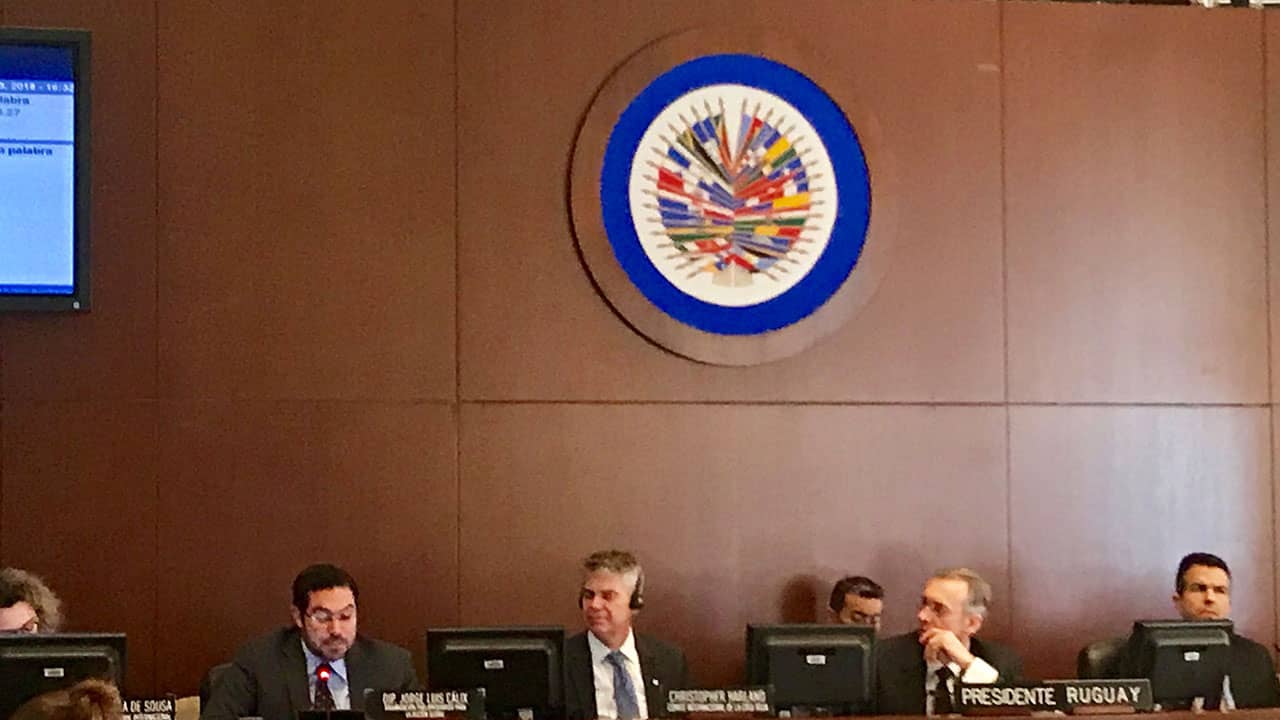
We can no longer allow the impunity of perpetrators of crimes that deeply shock the conscience of humanity. Dip. Jorge Cálix, Honduras
On 15 March 2018, Parliamentarians for Global Action (PGA), participated in the 10th Special Session of the Organization of American States (OAS) on the International Criminal Court (ICC), organized by the OAS Committee on Juridical and Political Affairs.
This Special Session on the ICC included the participation of Ambassador Hugo Cayrús, Chair of the OAS Committee on Juridical and Political Affairs and of this meeting; Mr. Dante Negro, Director of the OAS Department of International Law; Mr. James Stewart, Deputy Prosecutor of the ICC; Dr. Felipe Michelini, Member of the Board of Directors of the International Criminal Court’s Trust Fund for Victims and former PGA Board member; Ms. Antonia Pereira de Souza, External Relations and Cooperation Officer at Registry of the ICC; Diputado Jorge Cálix (Honduras), PGA member; Ms. Michelle Reyes, Regional Coordinator for the Americas of the Coalition for the ICC (CICC); and Mr. Christopher Harland, Legal Advisor of the International Committee of the Red Cross (ICRC).
During this high-level event, State representatives interacted with the panelists on measures that countries and other relevant stakeholders can take to strengthen the Rome Statute system through the promotion of universality, implementation of the Rome Statute in domestic legal orders, and cooperation with the ICC. This year marks the 20th anniversary of the adoption of the Rome Statute.
Diputado Jorge Cálix delivered a strong speech on behalf of PGA emphasizing the universality of the Rome Statute, in particular in the Americas. Dip. Cálix also referenced the fact that the OAS can play a significant role in fostering political will in the region, promoting accountability for international crimes through the ratification and implementation of the Rome Statute, as well as promoting cooperation mechanisms with the ICC and its member States. The OAS can provide a forum for countries such as Haiti and Jamaica that have publicly expressed their intention of becoming a States Party to the Rome Statute. Dip. Calix explicitly called on these two countries to ratify the Rome Statute.
Delegates of the twenty-two States represented, mostly from Latin America, expressed strong support for the ICC and the necessity to strengthen the implementation of the Rome Statute in domestic legal orders and adopt cooperation mechanisms with the Court. Paraguay highlighted its adoption of a complete implementing legislation of the Rome Statute, to which PGA contributed a great deal of technical assistance; Argentina noted its signature of the third and fourth cooperation agreement with the ICC on interim release and release of persons.
States emphasized different aspects of the Rome Statute system: Brazil, Chile and Guatemala expressed their strong support to the ICC; Costa Rica and Canada reinforced the plea for complete universality of the Rome Statute in the Americas and the world; Panama called on the States that have not yet done so, to ratify the Kampala Amendments to the Rome Statute on war crimes and the crime of aggression; Mexico and Peru intervened on the need to ensure an efficient cooperation with the ICC; Uruguay expressed its support to the Court and reminded the audience that it was the first country to have completely implemented the Rome Statute in the national legal framework, and that it remains committed to international justice.
Ecuador, intervening on commemorations of the 20th anniversary of the Rome Statute, informed that it will be hosting, in the framework of UNASUR, a seminar on cooperation with the ICC, in June 2018, in Quito.
Other States were represented at the Special Session: The United States, Suriname, Guyana, Haiti and Canada.
The Haitian delegate commented from the floor that there is a penal reform currently taking place in the country. The new draft criminal code has implemented the crimes under the Rome Statute. The delegate further added that the ratification of the Rome Statute by Haiti could only take place after the adoption of the new penal code. Considering the fact that this reform has been going on for approximately 3 years now, it is not known when the new penal code will be adopted. Furthermore, Haiti has no obligation to implement the Rome Statute before ratification, the practice being that implementation follows ratification. The assessment provided by the Haitian delegate at the Special Session is furthermore contrary to the commitments taken by pertinent national authorities during a meeting with a PGA delegation, in July 2017.
Unfortunately, Jamaica was not represented at the Session. PGA is prioritizing its efforts in Jamaica, where upon the initiative of its members, the Executive has already decided approximately 3 years ago to advance the process of ratification, which first requires the elaboration and adoption of a domestic Rome Statute implementing legislation. The draft implementing legislation is on the docket of the Attorney General’s Chambers. PGA hopes that the new Government and Parliament will take prompt action this year, to mark the 20th anniversary of the adoption of the Rome Statute.
While it is not a precondition to domesticate the Rome Statute before joining its treaty regime, the practice of Jamaica is aligned to that of several Commonwealth countries. The OAS can encourage the Government of Jamaica to expedite the transmission process of the draft implementing legislation to Parliament, for a parliamentary deliberation as soon as possible.
PGA will continue advocating for universality of the Rome Statute, including through the ratification of the Statute by Haiti and Jamaica. 2018 is a special year in which the OAS can significantly contribute to increasing the number of States parties to the Rome Statute in the Americas.
For more information, please visit: http://www.oas.org/en/sla/dil/international_criminal_court.asp.
